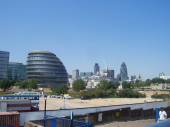
In a sobering warning, Jamie Dimon, the CEO of JP Morgan, has expressed his concerns about the world facing what he describes as the "most dangerous time" in decades.
This statement comes as global onlookers closely monitor the ongoing military crisis in Israel and Palestine, with billions holding their breath.
Dimon, the head of the world's largest bank, highlighted the fragile state of the global economy combined with rising geopolitical tensions as significant sources of unease. He emphasized that the wars in Ukraine and the Middle East could have adverse effects on energy and food prices, as well as international trade.
The situation in Gaza has intensified recently, with 1.2 million civilians being urged to evacuate the northern part of the strip within 24 hours to avoid the threat of military escalation. This exodus has added to the complexity of the situation and raised concerns about the humanitarian crisis in the region.
Speaking in the backdrop of JP Morgan reporting a 35 percent increase in profits for the three months ending in September, Mr. Dimon raised specific concerns about "quantitative tightening," which involves a central bank reducing its monetary reserves to strengthen its balance sheet.
He stated, "We still do not know the longer-term consequences of quantitative tightening, which reduces liquidity in the system at a time when market-making capabilities are increasingly limited by regulations. Furthermore, the war in Ukraine, compounded by last week's attacks on Israel, may have far-reaching impacts on energy and food markets, global trade, and geopolitical relationships. This may be the most dangerous time the world has seen in decades."
The comments from the 67-year-old banking executive come amid rising tensions and concerns about the rapidly evolving situation in the Middle East. While business at JP Morgan has prospered, driven in part by rising interest rates and the acquisition of the First Republic Bank, the global outlook remains precarious.
As the world watches with bated breath, international leaders and organizations are calling for restraint and resolution to the ongoing conflict, emphasizing the need for the safety and well-being of civilians caught in the crossfire. Photo by Steve Jurvetson, Wikimedia commons.






































